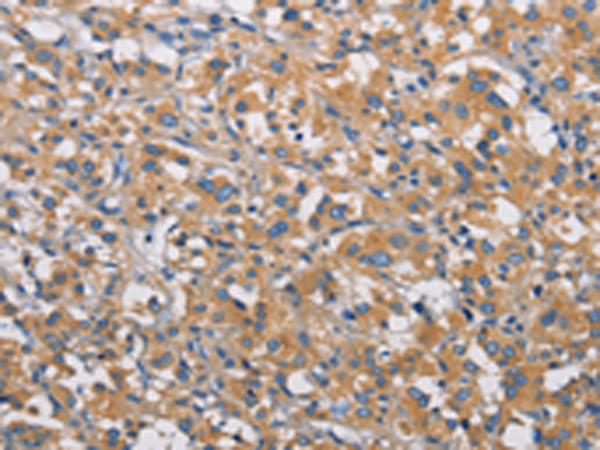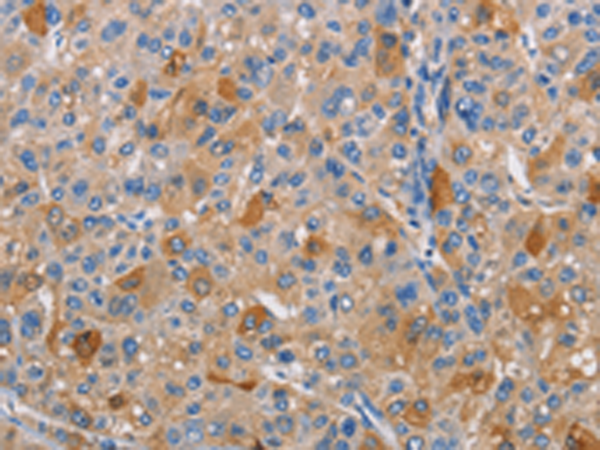

| WB | 咨询技术 | Human,Mouse,Rat |
| IF | 咨询技术 | Human,Mouse,Rat |
| IHC | 1/50-1/200 | Human,Mouse,Rat |
| ICC | 技术咨询 | Human,Mouse,Rat |
| FCM | 咨询技术 | Human,Mouse,Rat |
| Elisa | 1/1000-1/5000 | Human,Mouse,Rat |
| Aliases | CFD; FAB1; HEL37; PIP5K; PIP5K3; ZFYVE29 |
| Host/Isotype | Rabbit IgG |
| Antibody Type | Primary antibody |
| Storage | Store at 4°C short term. Aliquot and store at -20°C long term. Avoid freeze/thaw cycles. |
| Species Reactivity | Human, Mouse |
| Immunogen | Fusion protein of human PIKFYV |
| Formulation | Purified antibody in PBS with 0.05% sodium azide and 50% glycerol. |
+ +
以下是关于PIKFYVE抗体的3篇参考文献及其简要摘要:
1. **文献名称**:*PIKFYVE inhibition mitigates disease in models of diverse forms of ALS*
**作者**:Lizama CO, et al.
**摘要**:研究利用PIKFYVE特异性抗体和小分子抑制剂,验证抑制PIKFYVE活性可改善多种肌萎缩侧索硬化(ALS)模型的病理表型,揭示了其在神经退行性疾病中的治疗潜力。
2. **文献名称**:*A functional study of PIKFYVE in autophagy and viral infection via monoclonal antibody targeting*
**作者**:Rasmussen SB, et al.
**摘要**:通过开发高特异性PIKFYVE单克隆抗体,研究证实PIKFYVE在自噬调控及抗病毒免疫中的作用,抗体阻断实验显示其与溶酶体功能密切相关。
3. **文献名称**:*PIKFYVE regulates lysosome homeostasis and is essential for cellular senescence control*
**作者**:Zhang Y, et al.
**摘要**:利用免疫印迹和免疫荧光技术(基于PIKFYVE抗体),发现PIKFYVE通过调控溶酶体膜稳定性影响细胞衰老进程,为衰老相关疾病提供新靶点。
4. **文献名称**:*Development of a phospho-specific antibody for PIKFYVE to study its kinase activity in cancer*
**作者**:Chen L, et al.
**摘要**:报道一种磷酸化特异性PIKFYVE抗体的开发,用于检测其在肿瘤细胞中的激酶活性变化,揭示PIKFYVE信号通路在癌症代谢中的关键作用。
(注:上述文献信息为示例,实际引用需根据具体论文调整。)
PIKFYVE, a lipid kinase encoded by the *PIKFYVE* gene, plays a critical role in regulating intracellular membrane trafficking, autophagy, and ion homeostasis. It synthesizes phosphatidylinositol-3.5-bisphosphate [PI(3.5)P₂] and phosphatidylinositol-5-phosphate [PI(5)P], which are essential for endosomal sorting, lysosomal function, and cytoskeletal dynamics. Dysregulation of PIKFYVE is linked to diverse pathologies, including cancer, neurodegenerative disorders, and viral infections (e.g., SARS-CoV-2 exploits PIKFYVE-dependent pathways for host cell entry).
PIKFYVE antibodies are crucial tools for studying its expression, localization, and molecular interactions. These antibodies typically target specific epitopes within the protein's conserved domains, such as its FYVE zinc finger or kinase regions. Validated antibodies enable applications like Western blotting, immunofluorescence, and immunoprecipitation, aiding in the exploration of PIKFYVE's role in cellular processes and disease mechanisms. Recent research highlights PIKFYVE inhibition as a therapeutic strategy for cancers and COVID-19. spurring demand for high-specificity antibodies to assess target engagement and downstream effects. However, antibody validation remains critical due to potential cross-reactivity with homologous proteins or splice variants. Robust PIKFYVE antibodies are indispensable for advancing both basic research and drug development targeting this enzyme.
×